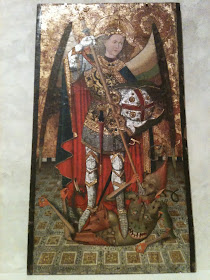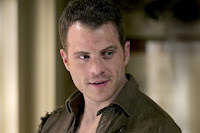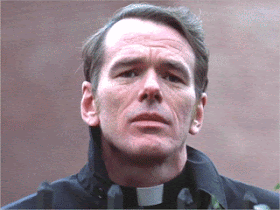"My mother was a housewife, but she was also an artist. My father was an electrical engineer."
--James Cameron
Much has been made of the sexual imagery of Ridley Scott's Alien. Stylistically based as it is on the work of H.R. Giger, it would be difficult for it not to be--after all, Mr. Giger has traditionally been fixated on all things genital-related. I won't even get into what those alien heads really look like. No doubt about it, sexual and birth-related imagery abound in the film.
But when it comes to Aliens, James Cameron's 1986 actionized sequel, that symbolism has been taken to its next logical stage (biologically speaking, anyway): Parenthood. In particular, motherhood. Aliens is preoccupied with maternalism, and I would go so far as to say that it is far and away the central theme of the movie.
To be sure, motherhood plays a certain role in
Scott's film, as well. After all, the Nostromo's central computer is called "MOTHER"--it doesn't get any more blatant than that. And the manner in which the main characters rebel and rail against their cold, unfeeling, even treacherous "Mother" throughout the film has "mommy issues" written all over it. This culminates, of course, in Ripley's desperate attempts to escape before Mother destroys the ship, as she refers to the disembodied ship's voice as "You bitch!"
However, it's in the second film that this theme, merely touched on in the first, comes to full fruition. And it all centers on Ripley, last survivor of the Nostromo. In the first film, Ripley is a decidedly asexual character. In fact, she isn't even feminized with the first name Ellen until the sequel. The fact that the character was originally written to be a man, and that not a single word of the script was changed following the decision to cast a woman, speaks volumes. In short, Ripley's womanhood is irrelevant to the plot. She is a protagonist who just happens to be a woman--albeit a very strong and resourceful one who's more fit for command than any of the men on the ship. But that part could've been played--as it was originally intended--by a man, and no one would've batted an eye.
 |
| "A-ffirmative." |
When we get to the second film, though, Ripley's womanhood comes front and center. The Ripley of Aliens could
not have been played by a man. Being a woman is essential to the character. In that film, James Cameron did something remarkable--he created cinema's first truly viable mainstream female action hero. (Considering Linda Hamilton in Terminator 2, the female action hero seems to be something of a preoccupation for the director.) Not only is being a woman essential to Ripley's character, but being a mother in particular.
Cameron's genius here is in giving us a character who is not a strong protagonist despite her femininity--as in Scott's film--but rather
because of her femininity. Cameron grafts all the tropes of the action movie hero--particularly the 1980s action movie hero--onto the image of the woman in her most traditional social role, that of the mother. And it works--because Cameron knows something most of us instinctively know, that mothers, as positively characterized, can be among the most determined, strong-willed, and powerful forces in all of fiction (as well as real life). Driven to protect their young, as well shaping who they grow up to become, the limits of their heroism are nearly boundless, and it could only be in a heavily paternalized culture as our own that this role would ever be demoted into something
lesser than.
Cameron knows better, and succeeds in making a character simultaneously maternal and decidedly kick-ass in a stereotypically "masculine" sort of way. In the era of Predator and Rambo, Ripley stands out as a subversion of that macho ideal. Cameron has the vision to take the trope to places other filmmakers were too close-minded to go--or perhaps where they feared their audiences wouldn't follow.
If you've only seen the theatrical version, you're missing a big piece of the puzzle. In one of the worst examples of a movie being somewhat hamstrung in the editing process and much better served by the director's cut, there is a scene--included in the latter but missing from the former--in which we learn that Ripley was a mother. Tragically, because she was trapped in hypersleep for nearly 60 years, she has missed out on her daughter's entire adult life, and learned that she lived to a ripe old age and died just a couple of years before Ripley was recovered in deep space. It's a shocking moment for her and for us, and informs the character so greatly for the rest of the film. It's mind-boggling to me why it would've been removed, thus removing an important part of the movie's impact.
Knowing that Ripley was a mother who lost her child changes the way we look at Ripley's relationship with Newt, the little girl who is the only survivor of the ill-advised colony on planet LV-426. It is that loss which colors the rest of the movie, and their interaction in particular. Ripley has suffered the greatest trauma an adult can suffer--the loss of a child--and she'll be damned if she's about to let it happen again. For her, Newt represents not just a surrogate for her own biological daughter, but a second chance to indirectly "make up" for what happened the first time. Ripley was powerless to change anything about what happened to her own child, but she has the power to make a difference in this little girl's life, to substitute for her lost parents, and protect her from harm in a way she couldn't do for her daughter.

The growing bond between Ripley and Newt is quite touching to watch, as she begins to care for the child, gradually filling the parental role in a very real and emotionally invested way. It represents the heart of a film that is often consumed with macho, militaristic sci-fi. Or is it? Perhaps one of Cameron's greatest tricks is to subvert this macho ideal. All is not what it seems here. Rather, the Space Marines are portrayed more or less as ineffectual cartoon caricatures (with the exception of Hicks as well as Vasquez--the toughest soldier in the squadron who is, quite tellingly, a woman). Also, they are unable to stop the alien threat and properly protect the civilians Ripley and Newt. It falls to Ripley, in the role of "warrior-mother", to stand up and do the job herself. And she does it better than her militarized compatriots, unencumbered as she is by testosterone-driven hubris. Rather, she channels her maternal instincts and becomes the most formidable of them all.
In the process, she becomes cinema's first bona fide feminine action hero. She's not a woman posing in a traditionally "masculine" way, as a character who could either be a male or female, but just so happens to be a woman. Rather, her womanhood is tied directly into her action role. This is not to say that womanhood is only defined by motherhood; but rather, it is to say that, as written, the Ripley of Aliens
must be a woman.
 |
| Make room for Mommy! |
For the film's final conflict, Ripley is forced to do battle with another mother. But this is a very different mother--an "anti-mother" if you will. Of course, I'm talking about the Alien Queen. It's interesting to note that this creature would appear to be created for Cameron's sequel. As conceived in the original Alien, there's no indication given whatsoever that there is such a being. In fact, given what we know now about Ridley Scott's mythos with the expansion of last year's quasi-prequel
Prometheus, it seem as if the eggs on that ship weren't necessarily laid by a mother at all, but rather, genetically engineered. Given the evidence we have, it's reasonably to argue that the "Alien Queen" device was invented specifically to further drive James Cameron's maternal themes in Aliens.
The Alien Queen represents the negative side of the mother--whereas we think of mothers bringing life, this mother, in a sense, brings death. Her offspring are killing machines, and her purpose for existing is solely to destroy and to breed others to destroy. She is the poisonous, cancerous mother. Nevertheless, it's worth noting that despite her ugly traits, she still retains that primal aspect of motherhood--the desperate need to protect her young. We can palpably feel her horror when Ripley torches the eggs in her chamber.

In order to truly save Newt in the end, Ripley must protect her from this evil maternal force which also seeks to possess her. And so, one of the watershed action films of the 1980s--if not of all time--culminates in a battle of Mother vs. Mother. And finally, it is the good that triumphs, the nurturing mother driven by altruism. Ripley redeems herself and achieves catharsis. In her final scene, she has become the surrogate mother, figuratively embracing Newt in the womb-like sanctuary of hypersleep.
Yes, this maternal triumph is heart-breakingly nullified by the opening scenes of the next film, David Fincher's Alien 3, when we learn that Newt dies when her hypersleep chamber malfunctions. In my opinion, this creative decision was destructive from a storytelling point of view. However, this need not diminish Cameron's achievement in Aliens, and when taken as a film on its own, as it should be, it remains one of the most impressive accomplishments of '80s cinema. Disguised as a traditional action sci-fi flick, James Cameron gave us one of film's most enduring odes to the nurturing power of motherhood.
















.jpg)






































